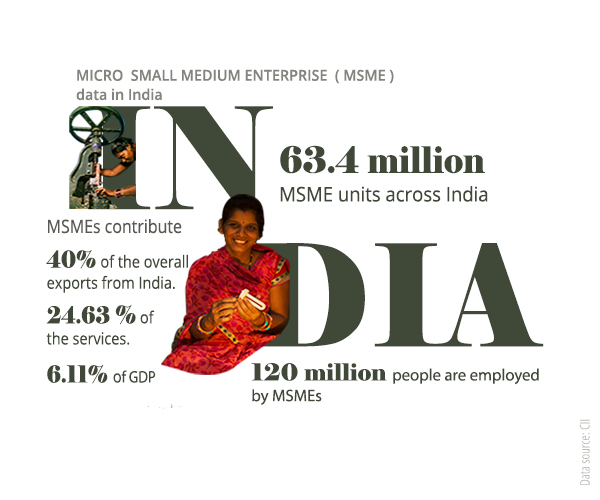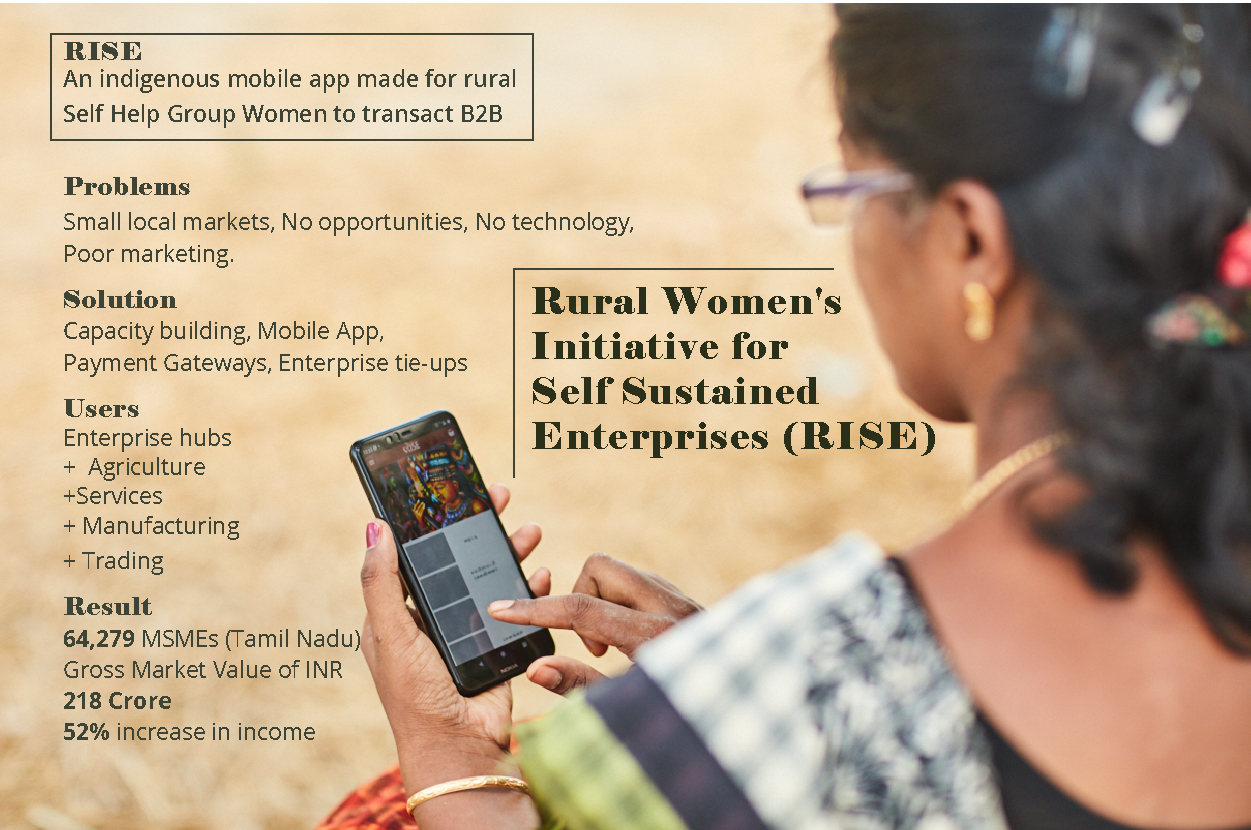Big things have small beginnings.
In the business world, these small beginnings are referred to as MSME or Micro, Small and Medium Enterprises. These have been in the limelight since the COVID-19 pandemic. There has been a new awakening on how MSMEs contribute to sustainable development of a country. Tips to rebuild Indian MSMEs are in order at this point of time.
A new normal in the world of business has brought about change to the MSME sector too. They now have a revised definition and a huge part to play in the country’s development in the post-COVID world. The MSME sector, however, has plenty to learn and change to work with the new world.
On MSME Day, we at Hand in Hand India have put together 8 Tips for rebuilding Indian MSMEs in the Post-COVID world.
Re-defining the MSME in 2020
The Micro, Small, and Medium Enterprise Development Act in 2006 was the beginning of small, but meaningful development in India. According to this act, MSME’s were classified into – Manufacturing and Service enterprises.
Today, there are more than 63 million MSME units (data from the CII), across India that contribute to 6.11 percent of India’s GDP and 24.63 percent of the country’s services. Next to agriculture, the MSME sector is the one that provides the largest employment for Indians, mainly in the rural areas.

In the current pandemic situation, India has recognized MSMEs to be the key solution to riding these tough times through the Atma Nirbhar Bharat Abiyaan. Stressing on supporting local industry and thereby building a resilient India, this scheme of the Government has changed the definition of the MSME.
The RISE project: Building women-led MSMEs
In 2015, we at Hand in Hand India, embarked on a futuristic project with Vodafone India Foundation and Indus Towers – RISE or Rural Women’s Initiative for Self Sustained Enterprises. As part of this initiative, we addressed three key components – entrepreneurship, technology and marketing and created an exclusive digital B2B market-place for our Self Help Group women entrepreneurs. Nearly 50,000 women from across Tamil Nadu were part of this project – some were into small scale manufacturing or assembly, others were tailors or even farmers.
One of the biggest challenges for women entrepreneurs remains the lack of market linkage support. Many have excellent products but with no channels to sell them. The RISE project bridged this gap by digitally empowering women and building their capacity to grow their businesses to scale.
An exclusive mobile application was developed serving as an online marketplace for women to interact and trade their products – all they needed was a smartphone! Training women for this project involved familiarizing them with smartphones, encouraging them to use the internet, to start with. On the ground, we also trained them to improve the quality of products, marketing them and educating them on Government regulations.

The Business-to-Business approach of the app is devised to provide a spectrum of products, giving the buyer options like any online store. The products range from appalams, pickles, rice to sarees and mats. It directly connects the buyer and seller through without the intervention of any middlemen.
Today, the RISE app has been instrumental in heralding a revolution in rural Tamil Nadu by helping SHG women to market their products and services to a wider audience. With a lot of potential for growth, we hope to replicate the RISE app across India.
The problems faced by MSMEs during COVID
With an unexpected lockdown for over three months, India’s MSME sector has taken a huge hit financially. Be it lack of cash flow, employee layoffs, lack of access to raw materials or stock that is stuck, small enterprises have been facing hardships on all fronts.
As an NGO working with women entrepreneurs, we have helped build several MSMEs across India. In our interactions with these entrepreneurs, we found them all to be affected in small or big ways due to the COVID pandemic. How these brave women are facing it is another story.
Take organic farmer Abirami – who has her own farm and sells traditional varieties of rice and pulses from the outskirts of Kancheepuram, Tamil Nadu. She sells all over the state and with the current pandemic, is stuck with stock of rice, pulses and oil at her end while her customers wait for their orders. In another corner of the country, Ramandeep Kaur struggles to source ingredients for her food processing unit in a small village of Punjab.
These are just some of the many problems that COVID-19 has brought into the lives of the MSME sector. Meanwhile, we spoke to our trainers, industry experts and entrepreneurs to gather these tips to rebuild Indian MSMEs to face the post-COVID world.
Tips to rebuild Indian MSMEs to face the post-COVID world
Tip #1 – Your business is Plan A, do you need a Plan B?
We got this first tip and most important one from Sathya, our entrepreneur friend who runs a large food catering unit. She told us how she re-looked at her business with a new eye. Her’s is a classic case of business loss – no customers, no cash flow. Sathya sat back and thought up a Plan B of growing horizontally and targeting clients in the same sector. She was quick to put it in action too. Read her story here.
Tip #2 – Have you registered your business?
You might have been doing business for years but not bothered to have registered it? The benefits of registering are many – from getting the right Government benefits or finance options and to be compliant with the law. Visibility of the business increases too, for instance if you want to be part of the Government of India’s e-marketplace, you will need to be a registered business.
Tip #3 – Need funds to restart?
Every small business would have suffered a setback in terms of earning. The Government’s new schemes for MSMEs have many benefits such as quick working capital availability, tax-filing deadline extension and more.
Tip #3 – Evaluate your spends
If your business is spending on marketing or advertising, those spends might need a revisit. What you deemed fit for a world before COVID might not be the same any more. Plan a smaller spend, decide on a different medium. Try to postpone CAPEX for the time being and conserve cash.
Tip #4 – Set your books right
Are your books in order, do you have receipts for your transactions? This is the time to get these in order. Move any transaction you can, to a digital platform. Examine your options among banks and other funding sources for any future requirement. Implement software to capture transactions and predict or forecast your business, this will help you in the long run.
Tip #5 – Brick-n-mortar Vs. Click-n-order
If your business is a traditional one that relies on a typical store front and cash counter, you may want to have another option too. Some part of your business could move online – payment online and delivery home maybe? If your business can easily be converted to an online one, it’s time to invest in a website or mobile app. Better still join an existing online platform such as RISE!

Tip #6 – Diversify your skills
Adapting to change is one of the key skills of any entrepreneur. If your main product or service is something that has taken a hit during the pandemic, adapt and venture into something connected or upskill yourself. Yet another of our inspiring women, Hema owns a beauty parlour and her business was down. But she has used her MSME license to advantage and started a sanitizer making unit with the help of her staff! Infact, the District Collectors in Rajasthan and Madhya Pradesh encourage women to take up such tasks that not only support their families and benefit the community at large. More stories on adapt or die here.
Tip #7 – Explore and Expand
Explore new means of expanding your customer base. If word of mouth has been one key factor in bringing you customers, try going online. Facebook, Instagram and Whatsapp are the brand new ways of expanding your business, maximising sales with the least acquisition cost!

Tip #8 – Go Local
With the pandemic also came the reverse migration of workers who were employed by MSMEs across India. If you are running an MSME and have run short of employees, it is time to spend this time in ‘Skilling the Locals’. Hire locals, skill them if needed and enjoy better goodwill in your town or city.
The lockdown might have brought difficulties for India’s MSMEs, but it has also brought with it a whole lot of opportunities. We work with our women entrepreneurs and tell them to look at the half-full-glass. These 8 tips to rebuild Indian MSMEs are our small way of telling entrepreneurs to look for opportunities. Our enterprise team is actively working with women despite the lockdown, remotely connecting with them to help them get back on their feet – either by counselling, virtual training or connecting to the relevant Government schemes.
Hand in Hand India’s Self Help Group (SHG) model is based on women empowerment and job creation. We mobilise women into groups, draw on the collective social capital, facilitate access to economic capital, provide skills training, hone their entrepreneurial ability and act as a catalyst for a gender-equal and empowered society. Read more about our work here.






